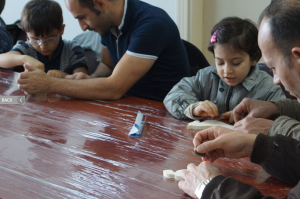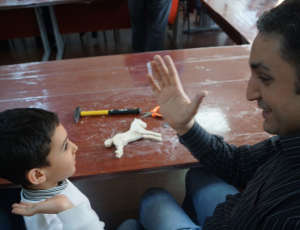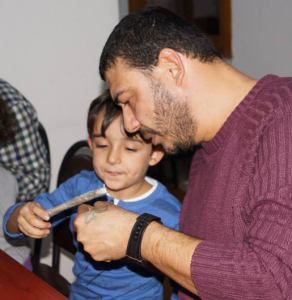 Earlier this summer, Father’s Day provided an opportunity to get the Turkish media talking about what role fathers should play in the upbringing of their children. Media outlets reaching all sections of society picked up on our press release revisiting some of the results of a major survey we’d commissioned the previous year.[1]
Earlier this summer, Father’s Day provided an opportunity to get the Turkish media talking about what role fathers should play in the upbringing of their children. Media outlets reaching all sections of society picked up on our press release revisiting some of the results of a major survey we’d commissioned the previous year.[1]
The researchers asked how often fathers regularly did the following: cooking, cleaning, laundry, tidying up, washing dishes, and changing their children’s nappies. In all cases, only between 2 and 4 percent said “regularly”; the others said “sometimes” or never”.
When it came to giving their children a bath, feeding them, helping them with homework, reading to them or putting them to sleep, the picture wasn’t much more encouraging – in each of these cases, fewer than 10% said “regularly”. The researchers found that mothers were much more likely than fathers to play with their children at home, take them to the park and even just to spend time chatting with them.
 With women expected to shoulder so much of the burden of household chores and childcare, it is perhaps not surprising that so few of them work. According to the World Economic Forum’s latest Gender Gap report, Turkey ranks 132nd out of 142 countries for women’s economic opportunity and empowerment.[2]
With women expected to shoulder so much of the burden of household chores and childcare, it is perhaps not surprising that so few of them work. According to the World Economic Forum’s latest Gender Gap report, Turkey ranks 132nd out of 142 countries for women’s economic opportunity and empowerment.[2]
These are two sides of the same coin: getting fathers more engaged in childcare, and giving mothers more choices through providing better daycare. There is a strong demand from women for better daycare, with 61% of female respondents to a recent trade union survey[3] saying it would be helpful for them – not only those who wanted to work, but also those who simply wanted the chance of a break from family duties.
As Turkey rapidly urbanises – the urban:rural divide is up to 73:27, according to latest World Bank data[4] – traditional childcare options are breaking down. Young people who have migrated from villages to cities are less likely to be able to call on grandparents and extended family.
The Bernard van Leer Foundation is working with a small number of like-minded municipalities in different parts of the country to showcase functioning local models of support for parents. Our aim is to create daycare centres that not only provide quality care for young children, but also serve as a hub for referring parents to other services, such as health, education, employment and social welfare. Additionally we are trying to support the national government and the municipalities in their efforts to deliver parenting training.
 The task is a long-term one. Practically, mothers will struggle to make use of new opportunities unless and until fathers start to take on a fair share of the responsibility for raising their children. And the norms that underpin the stark division of labour when it comes to childcare and domestic work are deeply supported by the economic and political structure in Turkey.
The task is a long-term one. Practically, mothers will struggle to make use of new opportunities unless and until fathers start to take on a fair share of the responsibility for raising their children. And the norms that underpin the stark division of labour when it comes to childcare and domestic work are deeply supported by the economic and political structure in Turkey.
Investing in children’s early years is becoming an important part of the debate around major issues in Turkey, including gender roles, employment, education and violence. We are therefore reaching out to and developing partnerships with different stakeholders, such as women’s organisations, municipalities and businesses, in our efforts to support parents.
Author: Yigit Aksakoglu, Turkey Representative, Bernard van Leer Foundation
Photo credit: Courtesy Bilinçli Aile Sağlıklı Nesiller
[1] The research was conducted by Bogazici University, Humanist Bureau and Frekans Research in 12 regions, 26 provinces with 4101 people. http://www.ailecocuksiddet.info/REPORT.pdf
[2] http://www3.weforum.org/docs/GGGR14/GGGR_CompleteReport_2014.pdf




























Leave a comment